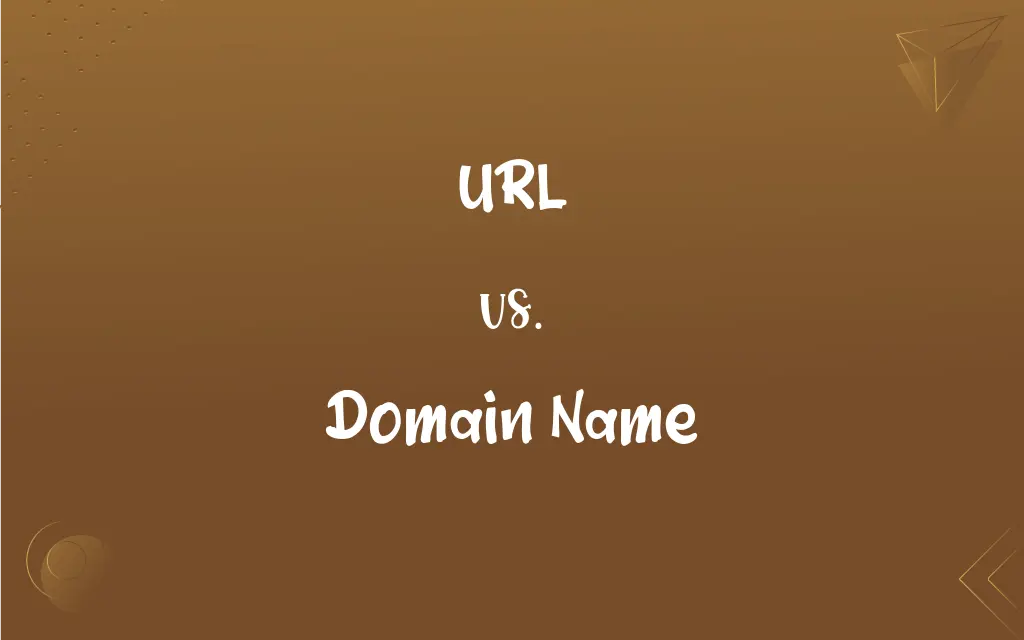URL vs. Domain Name: What's the Difference?
Edited by Aimie Carlson || By Harlon Moss || Published on March 31, 2024
A URL is a complete web address specifying the location of a resource on the internet, while a domain name is part of a URL, identifying a specific website's name.

Key Differences
A URL, or Uniform Resource Locator, is the complete web address used to locate a specific resource on the internet. It includes a protocol, domain name, path, and potentially a query string or fragment identifier. A domain name, in contrast, is a part of the URL that identifies a website or a server, typically in a format like example.com. It is a human-readable address that directs users to a specific location on the internet.
In the structure of a URL, the domain name serves as a key component that specifies the website's name. For instance, in the URL http://www.example.com/page1, example.com is the domain name. It is registered in the Domain Name System (DNS) to be uniquely associated with an IP address. The URL, however, goes beyond just the domain name, providing a complete and precise address to a specific page or resource on the web.
A URL can be likened to a full street address, including country, city, street, and house number, whereas a domain name is more like just the name of the street. The URL provides detailed information about the location and method of accessing a resource online. In comparison, the domain name is more about the identification and branding of the website it represents.
URLs are essential for web navigation, enabling browsers to retrieve and display web content from servers. They include a protocol (like HTTP or HTTPS) that defines how data is transferred. Domain names, while part of URLs, primarily function as an easy-to-remember alias for a numerical IP address, making it simpler for users to access websites without remembering complex numbers.
The uniqueness of a URL and a domain name is key to their function. Each URL is unique, pointing to a specific resource on the web. Domain names also need to be unique within their domain level (like .com, .org) but are repeated across different levels. The domain name forms the core of a URL, acting as a critical element in locating web resources.
ADVERTISEMENT
Comparison Chart
Definition
Complete web address for locating online resources.
Part of a URL, identifying a website's name.
Components
Includes protocol, domain name, path, and possibly a query string.
Just the website or server name in the URL.
Example
Http://www.example.com/page
Example.com
Function
Directs to a specific resource or page on the internet.
Identifies and locates a website or server.
Uniqueness
Each URL is unique, pointing to a specific online resource.
Unique within its domain level, but can be reused in different levels.
ADVERTISEMENT
URL and Domain Name Definitions
URL
A URL contains a protocol, domain name, and path, detailing the method and location of an online resource.
Find the article at https://www.newswebsite.com/articles/science.html
Domain Name
A domain name is a readable address that identifies and locates websites on the internet.
Our website's domain name is www.companyname.com
URL
A URL is a complete internet address that locates and accesses a specific resource online.
Visit our site at http://www.example.com/info.html
Domain Name
Domain names are part of URLs, providing an easy-to-remember alias for a numerical IP address.
Visit our blog at blog.companyname.com
URL
URLs are used in hyperlinks, enabling users to click and navigate to different web resources.
For registration, click on this link: http://www.eventsite.com/register
Domain Name
A domain name is unique to each website and is registered in the Domain Name System (DNS).
Check out our new domain name: www.newstartup.net
URL
URLs enable web navigation and data transfer over the internet, guiding browsers to the desired content.
Download the file from ftp://www.filesite.com/downloads/setup.exe
Domain Name
Domain names are critical for branding and making websites easily accessible to users.
Find us online at www.brandname.store
URL
A URL is a unique identifier for web pages, images, videos, and other resources on the web.
Check the image at https://www.photogallery.com/images/sunset.jpg
Domain Name
Domain names often include a top-level domain (TLD) like .com, .org, or .net, indicating the nature or origin of the website.
Our educational resources are at www.school.edu
URL
An internet address (for example, http://www.hmhco.com/about-hmh), usually consisting of the access protocol (http), the domain name (hmhco.com), and optionally the path to a file or resource residing on the server where the domain name resides (about-hmh).
URL
The address of a web page on the world wide web
FAQs
How do URLs and domain names work together?
The domain name is a component of a URL, helping to identify and locate a website within the URL structure.
What is a URL?
A URL (Uniform Resource Locator) is the complete web address used to locate a specific resource on the internet.
What is a domain name?
A domain name is a part of a URL, identifying a website's name and making it accessible via an easy-to-remember address.
What does a URL consist of?
A URL consists of a protocol, domain name, path, and potentially a query string or fragment.
Is www part of the domain name or URL?
"www" is part of the domain name and URL, traditionally indicating a web server.
Can a URL exist without a domain name?
No, URLs typically require a domain name to direct to a specific website or resource.
Are domain names case sensitive?
Domain names are not case sensitive, but the path and file names in a URL can be.
What is a top-level domain (TLD) in a domain name?
A TLD is the last segment of a domain name, like .com, .org, or .gov, indicating the domain's category or country code.
What is the purpose of the path in a URL?
The path in a URL specifies the exact location of a resource within the website.
What is the significance of a protocol in a URL?
The protocol (like HTTP or HTTPS) in a URL specifies how data is transferred and retrieved from a resource.
How do URL shorteners work?
URL shorteners create a shorter, more manageable version of a long URL, redirecting to the original URL.
Can two different websites have the same domain name?
No, each domain name is unique and can only be associated with one website.
Can a URL contain a port number?
Yes, a URL can contain a port number to specify the communication endpoint for a specific service on a server.
Are there restrictions on domain name length?
Yes, domain names typically have a maximum length limit, often 253 characters.
Can a domain name have special characters?
Domain names can include hyphens but not other special characters; however, Internationalized Domain Names (IDNs) can have characters from non-Latin scripts.
How are URLs used in web browsers?
URLs are entered into web browsers to access specific web pages or resources on the internet.
How does a domain name relate to an IP address?
A domain name is a human-readable form that translates to an IP address, which computers use to locate a website.
What is DNS in the context of domain names?
DNS (Domain Name System) translates domain names to IP addresses, allowing browsers to locate websites.
What is HTTPS in a URL?
HTTPS (Hypertext Transfer Protocol Secure) in a URL indicates a secure connection using encryption for data transfer.
What is a subdomain?
A subdomain is a secondary part of a domain name, used to organize and navigate to different sections of a website.
About Author
Written by
Harlon MossHarlon is a seasoned quality moderator and accomplished content writer for Difference Wiki. An alumnus of the prestigious University of California, he earned his degree in Computer Science. Leveraging his academic background, Harlon brings a meticulous and informed perspective to his work, ensuring content accuracy and excellence.
Edited by
Aimie CarlsonAimie Carlson, holding a master's degree in English literature, is a fervent English language enthusiast. She lends her writing talents to Difference Wiki, a prominent website that specializes in comparisons, offering readers insightful analyses that both captivate and inform.































































